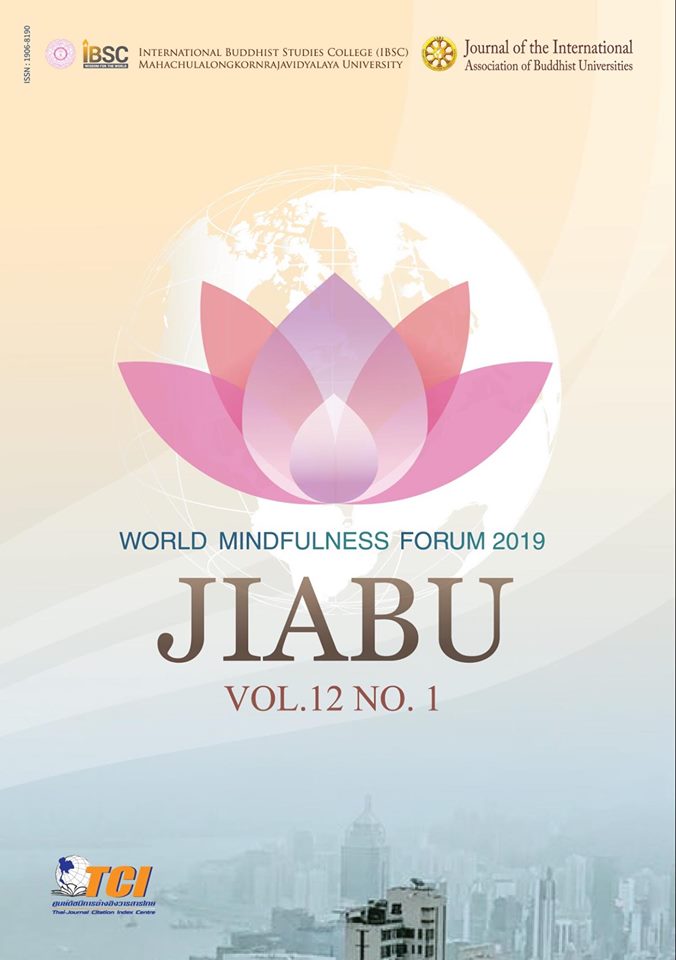A Buddhist Well-Being Model and Its Contribution to a Society
Main Article Content
Abstract
This research article applies mixed methods between qualitative and quantitative
approaches. At the first stage, the qualitative approach is employed in terms of documentary
review of literature and the in-depth interview of twelve key informants. At the second stage,
the quantitative approach is applied to survey research using the questionnaires constructed
based on information from the interview and documentary research, including data analyses
and inquiry of Buddhist factors for well-being on observation, n=460 people, from 20-59
years old. Statistics used in research include percentage, arithmetic mean (X ¯), standard
deviation (S.D.), T-Test, F-Test, Pearson’s Product Moment Correlation, and Multiple
Regression Analysis. The findings show that the three Buddhist factors—sīla, samādhi,
paññā—can the mostly explain well-being of working age people in the Bangkok Metropol
area 56 % at the level of significance of .001 (p<.001). A Model of Buddhist Well-Being
with this Threefold Training as the Buddhist explanatory variables and the theoretical base
for the development of the human being spirituality and behaviour will contributes the greatest
benefits to the society.
Article Details
Views and opinions expressed in the articles published by The Journal of the International Association of Buddhist Universities (JIABU), are of responsibility by such authors but not the editors and do not necessarily reflect those of the editors.
References
Majjhima Nikāya: The Collection of the Middle Length Sayings. vol 2. no. 11. trans.
by I.B. Horner. Oxford: PTS, 1989.
Khuddaka Nikāya (Khuddaka-Pāṭha). (Pāli). Edited by Helmer Smith. Oxford: Oxford
University Press, 1915.
Secondary Sources
Dhammasami, Venerable Dr. Khammai et al. (eds.). 2010. Global Recovery through
Mental Well Being, Global Recovery: The Buddhist perspectives. The 7th
International Buddhist Conference on the United Nations Day of Vesak Celebrations.
Ayutthaya: Mahachulalongkornrajavidyalaya University, pp.
17-719,545-553, 708-719.
Shaw, Sarah. 2006. Buddhist Meditation: An anthology of Texts from the Pāḷi Canon.
New York: Routledge.
Ñāṇādicca, Venerable. 1995. The Thirty-Eight Blessing for World Peace. Rangoon:
Rangoon Gazette Ltd.
Payutto, P.A. 2018. Buddhadhamma: The Law of Nature and Their Benefits to Life.
Bangkok, Thailand: Buddhadhamma Foundation.
Myaing Gyi Ngu, Sayadaw. 20002. Question and Answer on Mingala Sutta. Myaing
Gyi Ngu Special Region, Myanmar: Mann Ba Nyunt Pe. (English version by U Than Htun
Shwebo).
Naipat, Ongart. 2005. Quantitative and Qualitative Research Methodologies in
Behavioral and Social Sciences. Bangkok: Samladda Priniting.
Cohen, Louis, Lawrence Manion & Keith Morrison. 2007. Research Method in Education.
6th ed. USA: Taylor & Francis e-Library


